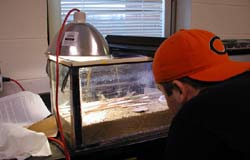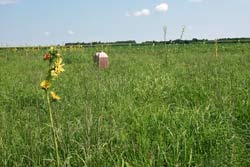
"It
is interesting to contemplate a tangled bank, clothed with many plants of many kinds,
with birds singing on the bushes," -- Charles Darwin, 1859
 The curriculum in
biology offers an opportunity for students to understand the structures and
processes that characterize life and to appreciate the tremendous diversity of
living organisms. The curriculum in
biology offers an opportunity for students to understand the structures and
processes that characterize life and to appreciate the tremendous diversity of
living organisms.
Course work is balanced among three scales of biological
organization:
-
Cell/molecular
-
Physiology/organismal
-
Ecology/evolution
An important component of the major
is independent research that enables the student to become familiar
with the process of science by investigating a specific biological
problem in the laboratory or field.
 Most courses are extensive rather
than intensive in content, thus providing the student with
considerable breadth in the biological sciences as a whole. Such
training may lead to more specifically focused work
such as graduate or
professional school, employment in government or industry, or
teaching at the secondary or college level. Biologists who are
graduates of liberal arts colleges often offer employers a broader,
more flexible outlook in approaching problems. Most courses are extensive rather
than intensive in content, thus providing the student with
considerable breadth in the biological sciences as a whole. Such
training may lead to more specifically focused work
such as graduate or
professional school, employment in government or industry, or
teaching at the secondary or college level. Biologists who are
graduates of liberal arts colleges often offer employers a broader,
more flexible outlook in approaching problems.
The department of biology occupies
the fourth floor of the Haldeman-Thiessen Science Center.
The major course requirements in biology consist of:
-
Investigating Biological
Concepts (BIOL 150)
-
Introduction to Ecology,
Evolution and Diversity (BIOL 155)
-
Cell Biology (BIOL 200)
-
Genetics (BIOL 202)
-
Anatomy & Physiology (BIOL
204)
-
Ecology (BIOL 307)
-
Two elective courses in BIOL
(see list below)
-
Science Seminar (BIOL 350 -- taken
for two semesters)
-
Introduction to Research I
(BIOL 222)
-
Introduction to Research II (BIOL
322)
-
Research, two semesters (BIOL 440
and 450) or appropriate
summer research experience
-
Organic Chemistry (CHEM 130)
-
General
Chemistry (CHEM 140)
-
Analytical Chemistry (CHEM 220)
-
Analytical
Chemistry Lab (CHEM 225)
-
Statistics for the Sciences
(MATH 207)
-
Calculus I (MATH 151)
-
Physics I (PHYS 130)
Electives in
Biology include:
-
Molecular Biology
-
Molecular Biology Laboratory
-
Microbiology
-
Advanced Physiology
-
Comparative Vertebrate Morphology
-
Vertebrate Embryology
-
Parasitology
-
Field Botany
-
Field Zoology
-
Animal
Behavior
-
Evolution
Biology Minor
A minor in biology consists
of the six core courses in Biology that are required for the major.
-
BIOL 150
Biological
Concepts
-
BIOL 155
Ecology, Evolution and
Diversity
-
BIOL 200 Cell Biology
-
BIOL 202 Genetics
-
BIOL 204 Anatomy & Physiology
-
BIOL 307 Ecology
 Teacher
Certification Teacher
Certification
The student who seeks certification
for secondary education must complete the
Biology major cited above,
as well as a program of study in education. Their work
in biology also
qualifies the candidate to teach general science.
Other requirements for certification are described in the Education
Department section of the catalog. Education 342,
Secondary School Science Curriculum and Methods, must be
included.
 |

